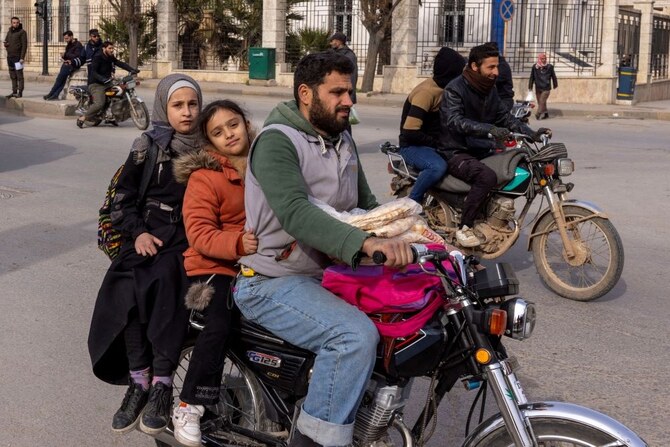NEW YORK CITY: The UN’s Commission of Inquiry on Syria on Monday called for urgent action to suspend international sanctions on the country, to ensure they do not impede the delivery of aid to more than 17 million Syrians in dire need of help.
It also urged the international community to step up humanitarian assistance to the war-ravaged country, where relief efforts are being overwhelmed by the sheer scale of the displacement crisis.
“Sanctions cause disproportionate harm to the poor and most vulnerable, and now is the time to give Syrians the chance to rebuild their own country,” said Paulo Sergio Pinheiro, who chairs the commission.
Following the start of the Syrian civil war in April 2011, key nations and international organizations, including the US and the EU, imposed a range of economic sanctions on the country. The main aim was to put pressure on President Bashar Assad and his regime over their actions during the conflict, including human rights abuses, war crimes and the use of chemical weapons.
The commission also called for all involved in the conflict to uphold their obligations relating to the protection of civilians, the humane treatment of those who lay down their weapons and surrender, and the safeguarding of evidence that could be used to hold those guilty of war crimes accountable for their actions.
As the conflict intensifies in northern Syria and the new government in Damascus consolidates its control, the commission stressed that all factions must comply with international human rights and humanitarian laws.
“The caretaker government in Damascus, as well as other parties in the Syrian conflict, should ensure that their forces are abiding by their stated commitments to prevent violence and protect civilians, in particular the most vulnerable communities,” said Pinheiro.
The commission also highlighted concerns about human rights abuses in detention facilities. It has documented widespread violations that have taken place since 2011, including enforced disappearances, torture, rape and other forms of sexual violence. The country’s former government is accused of crimes against humanity and war crimes in detention centers that are notorious for their brutality.
The commission stressed the importance of preserving the sites of mass graves and other evidence of war crimes to facilitate forensic investigations and efforts to ensure those responsible face justice. The new authorities in Damascus, it added, must ensure that arrest and detention records remain intact and protected “in a manner that ensures their utility in future accountability processes, and that no evidence is destroyed or tampered with.”
Commissioner Lynn Welchman said: “The relief felt by Syrians when prisoners are freed from the former government’s abominable detention facilities cannot be overstated.”
However, she added: “For all those Syrians who do not find their loved ones among the freed, this evidence may be their best hope to uncover the truth about their missing relatives, alongside the testimonies of their fellow detainees who survived the most dreadful suffering and who have just been released.
“They have a right to the truth and the evidence must not be destroyed or tampered with.”
The commission stated that any future trials for war crimes and crimes against humanity must be conducted in public, with full transparency and in full accordance with the standards required to ensure trials are fair.
Commissioner Hanny Megally said: “Syrians deserve justice after near 14 years of brutal war, where almost every crime listed in the Rome Statute has been committed.
“Perpetrators should be brought to justice, especially those most responsible, and Syrians must be in the lead in shaping the justice and accountability response. The international community must be ready to support them.
“Full justice for victims and survivors will undoubtedly need to be broader than trials, and they should be allowed to pursue their demands for truth, reparations and legal and institutional reforms.”
Meanwhile, the humanitarian situation remains dire as fighting continues across northern, eastern and northeastern Syria. Since late November, more than a million people have been displaced by the escalating conflict, with continuing airstrikes by Israel, the US and Turkey further complicating the crisis.
Israel reportedly has carried out more than 500 airstrikes in Syria, in violation of a 1974 disengagement agreement between the countries. US forces have carried out dozens of airstrikes against Daesh targets, while Turkish forces have stepped up strikes against Kurdish groups in northeastern Syria, including US-backed Syrian Democratic Forces.
UN Secretary-General Antonio Guterres has described such military action as “extensive violations of Syria’s sovereignty and territorial integrity.”
Against this volatile backdrop, the commission renewed its call for an immediate ceasefire among all warring parties.




























